From the desk of Roland Rocchiccioli – 31 January

Revisionist: To classify this a settlement is playing fast and loose with the truth! Photo: SUPPLIED
There is a syntactic problem with the curt cliché and the smart-alecky riposte. They leave you second-guessing as to exactly what the bloody hell is meant. The Prime Minister, Scott Morrison, is not labelled ‘Scotty from Marketing’ impertinently. There is cause!
HE said, appraising the arrival of the ships of First Fleet at Sydney Cove, 1788: “You know, when those 12 (sic) ships turned-up in Sydney, all those years ago, it wasn’t a particularly flash day for the people on those vessels either.”
Out of ignorance, or an imperious disregard, politicians have a penchant for re-writing history to suit the occasion and their political agenda.
For the record, and accuracy: there were only 11 ships in the First Fleet; and Captain Cook did not, as Mr Morrison has erroneously claimed, circumnavigate New Holland.
In the same way, the former Prime Minister, Tony Abbot, spuriously reasoned, the arrival of the First Fleet was not an invasion but a settlement.
If one were to hypothetically remove New South Wales and Botany Bay from the equation, and forensically analyse-in-abstract the relevant facts, it would be difficult, even impossible, to classify the landing as anything other than an invasion. It involved the raising of the Union Flag and the claiming of the land in the name of the British King.
While it may not have been, as Mr Morrison so incompetently proffered, a ‘flash day’ for the new arrivals, it was an even less ‘flash day’ for the Blackfella, whose unbroken occupancy of the Great Southern Land spans more than 50,000 years. Let us not forget: they are the oldest living civilisation.
For the avoidance of ambiguity: History has shown, Saturday, 26 January, 1788, marked the dropping of a curtain on their ancient history.
While it is true, they did not, as a less compassionate member of my mob argued in defence, “build supermarkets or anything”, they did have a system of government and law; they had ancient traditions and practices; and they lived peripatetically, and for the most part, in peace.
Aboriginal ethos is an intertwined triumvirate between the land, to which they have a profound spiritual connection, the people, and creation.
In the same way Christians believe in the Nazarene, for the Aborigines it is the Land. It is their Mother. It is steeped in their culture. They have a responsibility of care. It forms their culture and sovereignty.
The 250 Aboriginal languages described, intimately, the land and the culture of the people who spoke them, and explains why the removal of Aboriginal people from their ancestral lands has been so disastrous. The loss of country – dispossession at Law – leads to a shattering loss of that language and culture.
While the degree of difficulty for the first white convicts is well documented, and it would be trivialising to suggest the founding of the new colony was anything less than punishing, it is both odious and insulting to compare the invaders’ hardship with the oppressive suffering, displacement, massacres, and the extant apartheid which followed for the Aborigines.
Mr Morrison’s careless use of language is deeply insulting and highly insensitive. It serves only to diminish the problem; does little to advance the narrative, and exacerbates an already challenging and complex Australian conundrum.
Furthermore, and disquietingly, Mr Morrison’s castigation of Cricket Australia suggests a serious disregard for the voice of the people. Words carry with them chain reactions, like a stone which is thrown into a pond.
For the record: the three days of supposed endless fornication said to have occurred when the women came ashore on that fatal day, and which numerous imaginative scribes have salaciously promulgated, is an historical solecism. To Professor Manning Clarke’s unending regret, and recant, it was a consequence of his misreading of available documents.
By any balanced reading of international law, 1788 was an invasion.
Roland can be heard with Brett Macdonald each Monday at 10.45am on 3BA and contacted via [email protected].


















